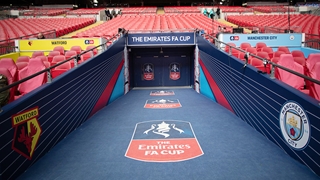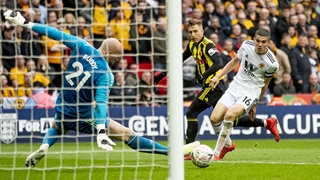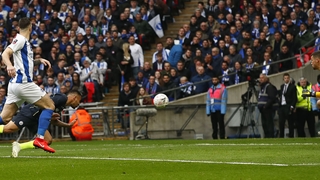
Welcome to the Emirates FA Cup Final between Manchester City and Watford.
As ever, we’ve had a fantastic competition this year, with both of these teams showing that the magic of the Cup is alive and kicking.
Manchester City’s league form has been imperious. I’d like to take this opportunity to congratulate them on not only retaining their title, but creating a truly memorable season. But in the Cup, as fantastic as they have been in the league, they were just moments away from a giant-killing, coming from two goals down against Swansea City before a last-gasp winner. The Cup always throws up something special.
Watford know that comeback feeling, too; 2-0 down against Wolves before a magical fightback sealed one of the best semi-finals I have seen in my three years as FA Chairman.
Good luck to both sides in today’s Final. As ever, a huge thank you to today’s officials today as well. Kevin Friend leads the team, which includes full VAR. Thank you to him, all the officials and welcome to their families who join us at Wembley today.
Also welcome and thank you to both Emirates and its president Sir Tim Clark for their continued support.
I’d also like to thank Sir Tim for his support of our Heads Up campaign which we announced on Wednesday. The campaign will run next season and partners with our President, HRH the Duke of Cambridge’s Heads Together charity. Together we will create the biggest-ever conversation in mental health and help reduce stigma associated with it. Sir Tim has offered incredible support for the campaign, which will use the Emirates FA Cup to activate Heads Up next season.
As I mentioned earlier, I’m coming to the end of my third season as Chairman of The FA and, given the CEO transition we are going through, it seems an appropriate time to review both progress and the challenges facing English football.
Nearly 10 years ago I began the transition from club football when I was appointed chairman of the Football League. Back then I would say that English football was not necessarily in rude health. England had failed to qualify for Euro 2008 and the 2010 World Cup provides us with few fond memories. But two projects were just starting.
The elite player performance plan was driven by the Premier League with the Football League as junior partners and a financial contribution from The FA. It aimed to provide structured development to elite young talent in the English game.
Secondly, St. George’s Park was being developed by The FA as a centre of excellence for English football, where top English international talent of all age groups and both genders could learn under the best coaches using world-class facilities. SGP remains a fantastic facility, but it was an incredible investment for an FA that was focused on sports administration and lacked the skills to strategically reposition itself or to embrace modern business practices.
Given the massive investment in the new Wembley, I had a few reservations about taking on the financial burden of creating SGP. To be frank, The FA didn’t have enough executive talent to manage a business heading towards a £500m turnover and we simply weren’t spending enough on football. So The FA needed to change from well-meaning sports administrator, to a dynamic, forward thinking business. My predecessor as Chair, Greg Dyke, and the Board in place in 2015 made a transformational decision; to find a new CEO who could restructure The FA, professionalise it and find the funds needed to repay our debts and increase the investment in the Football Foundation.
Under Martin Glenn’s leadership, The FA was restructured and the performance of The FA has been transformed together with its relationship with stakeholders. As with all restructuring, it was painful, but it was very much needed.
Those stakeholder relations have improved. The partnership with the national game is good. Facilities are being built to address the dreadful shortfall of decent pitches. Only last month I was fortunate enough to open an excellent new County FA facility in Hertfordshire, funded by the Football Foundation, Premier League and The FA. I have also had the opportunity to experience the wonderful work our County FAs do at grassroots level to nurture the game, co-ordinating and supporting the hard work of a legion of volunteers across England.
The FA now has in place top quality executive talent, a robust strategy, record levels of revenue and distributions back in to football. On behalf of the Board I would like to thank Martin for his tireless service.
Speaking personally, I’ve always championed internal succession. If you care about an organisation, you have a duty to ensure continuity of leadership. I sat on a panel back in 2016 to appoint Gareth Southgate and his knowledge of The FA, SGP and our youth development pipeline has been of huge benefit to the progression of the team.
And so I am delighted that we appointed an internal candidate, Mark Bullingham, as our new CEO. He won the job against a strong field of top-quality candidates provided by a leading executive search firm. I am sure Mark will do a cracking job – but he’s got big shoes to fill.
Ten years on and if you compare England’s performance in South Africa and Russia, it is chalk and cheese. We also have an all-English Champions League final and an all-English Europa League final. We’re Nations League finalists and well placed for the Women’s World Cup in France this summer.
The talent that won development World Cups is percolating into top English and continental teams. Our women’s game, led by Baroness Sue Campbell, is providing the growth in participation essential to our game and the Lionesses, under Phil Neville, provide the role models on the global stage.
We have moved forward in so many ways. But we have much to deal with moving forward, too. I could talk about many challenges facing our game but to be frank I would like to focus on the elephant in the room. We need to tackle racism and discrimination. It’s time to draw a line and take less comfort from the undeniable truth that things are better than the 1970s and 80s and set our standards higher.
I would like to put a proposition to English football to consider. Over the last two years we have responded to a safeguarding crisis in English football following a torrent of revelations about historic child abuse. In English football we now have zero tolerance for child abuse. One child abused is one too many.
When is our game going to move to zero tolerance of discrimination, whether it be on the grounds of race, gender, religion or sexual orientation? This is not ritual hand-wringing, we need to change.
The FA has targets for BAME and female leaders, employees and coaches. This has come from our inclusion plan ‘In Pursuit of Progress’. It has been a great step forward and follows the simple adage; what gets measured, gets done. So The FA Board in the new season will receive a discrimination update at every Board meeting as it now does for safeguarding. We will monitor how we are doing across the country, and we’ll put in targets for change.
I encourage all organisations within football to consider how you become representatives of your players and fans. I do not seek to compel you because I can’t and it would be wrong. I seek to convince you because it is the right thing to do, for your organisations and for football.
Our second major challenge is facilities. We remain light years behind Germany, for example. Our challenge is clear; only 1 in 3 grass pitches are of adequate quality and 1 in 6 matches are called off due to poor pitch quality. The FA intends to address this. We have created a simple vision; to ensure that every adult and child has a great place to play football within a 15-minute journey from their home. Despite record levels of investment by football into grassroots facilities, at the current rate of change it will take us a quarter of a century to get there. That’s too slow at a time when the England teams and English clubs are inspiring the next generation.
To reach our goals in 10 years, we’ll need some £600m of additional investment. We are looking into ways of doing this, through pension fund investment or Government public policy, rather than financial support. The challenge is huge, but we must ensure that football is accessible for all.
Finally I would like to pay tribute to our retiring vice-chairman Mervyn Leggett. He leaves our Board after finishing his nine-year term limit and a lifetime of service to grassroots football and a huge supporter in the development of women’s football.
Women’s football is a great example of where The FA has driven growth and changed the narrative in the last few years, genuinely making the game more inclusive, and Mervyn has been a driving force in that change. I have relied heavily on Mervyn’s experience and advice and thank him sincerely for his service to football.
That leaves me only to say, have a wonderful afternoon and enjoy the match.









